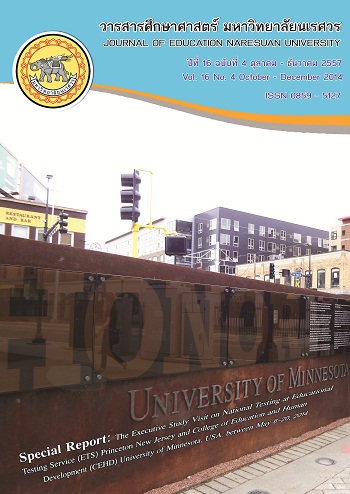การพัฒนารูปแบบการเรียนการสอนเพื่อเสริมสร้างความสามารถในการแก้ปัญหาทางวิทยาศาสตร์โดยอิงแนวคิดประสบการณ์การเรียนรู้ผ่านสื่อกลาง สำหรับนักเรียนชั้นมัธยมศึกษาตอนต้น
Main Article Content
Abstract
บทคัดย่อ
การวิจัยนี้มีวัตถุประสงค์เพื่อพัฒนารูปแบบการเรียนการสอนเพื่อเสริมสร้างความสามารถในการแก้ปัญหาทางวิทยาศาสตร์โดยอิงแนวคิดประสบการณ์การเรียนรู้ผ่านสื่อกลางสำหรับนักเรียนชั้นมัธยมศึกษาตอนต้น วิธีดำเนินการวิจัยมี 3 ขั้นตอน คือ 1) การศึกษาแนวดำเนินการจัดการเรียนการสอนวิทยาศาสตร์โดยอิงแนวคิดประสบการณ์การเรียนรู้ผ่านสื่อกลางสำหรับนักเรียนชั้นมัธยมศึกษาตอนต้น โดยสังเกตการจัดการเรียนการสอนที่มีครูทำหน้าที่เป็นสื่อกลางในการจัดประสบการณ์การเรียนรู้เพื่อพัฒนาให้ผู้เรียนมีความสามารถในการแก้ปัญหาทางวิทยาศาสตร์ของครูต้นแบบแห่งชาติด้านวิทยาศาสตร์ 5 คน 2) การสร้างและตรวจสอบคุณภาพของรูปแบบการเรียนการสอนและเอกสารประกอบรูปแบบการเรียนการสอน โดยผู้เชี่ยวชาญ 5 คน และทดลองนำร่องรูปแบบเพื่อพิจารณาความเป็นไปได้กับนักเรียนชั้นมัธยมศึกษาตอนต้นที่ไม่ใช่กลุ่มตัวอย่าง จำนวน 1 ห้องเรียน และ 3) การทดลองใช้รูปแบบการเรียนการสอน โดยนำไปทดลองใช้กับนักเรียนชั้นมัธยมศึกษาปีที่ 3 โรงเรียนวิทยานุกูลนารี จังหวัดเพชรบูรณ์ สังกัดสำนักงานเขตพื้นที่การศึกษามัธยมศึกษาเขต 40 จำนวน 1 ห้องเรียน
ผลการวิจัย พบว่า
1. การจัดการเรียนการสอนของครูต้นแบบแห่งชาติด้านวิทยาศาสตร์ พบว่า ครูมีบทบาทสำคัญทั้งในการเตรียมกิจกรรมการเรียนรู้ การดำเนินกิจกรรมการเรียนรู้ และการวัดและประเมินผลการเรียนรู้ คือ ครูต้องศึกษาสาระการเรียนรู้ในหลักสูตรและตัวชี้วัดเพื่อวางแผนจัดกระบวนการเรียนรู้ให้มีความต่อเนื่อง พร้อมทั้งเตรียมวัสดุอุปกรณ์ สื่อการเรียนการสอนที่จะใช้ในการจัดกิจกรรมการเรียนการสอน ในการจัดกิจกรรมการเรียนการสอน ครูสร้างความสนใจด้วยการทบทวนเนื้อหาเดิมหรือนำเสนอสถานการณ์เพื่อกระตุ้นให้ผู้เรียนตั้งใจและตอบสนอง ตระหนักในคุณค่าของการเรียนรู้ เชื่อมโยงกับความรู้เดิม ซักถามให้เกิดความท้าทายในการเรียนรู้ สำรวจและค้นหาด้วยการชี้แนะวิธีการศึกษาและวิเคราะห์เอกสารเพื่อให้ผู้เรียนตั้งใจและตอบสนอง ตระหนักในคุณค่าของการเรียนรู้ เชื่อมโยงกับความรู้เดิมและทำกิจกรรมกลุ่ม วางแผนลงมือทำงานด้วยการแนะแนวทางการปฏิบัติ กระตุ้นให้ปฏิบัติ ติดตามและช่วยเหลือให้การเสริมแรงอธิบายและลงข้อสรุปด้วยการทบทวนการปฏิบัติ ซักถามช่วยเสริมข้อมูลหรือแก้ไขให้ถูกต้องเพื่อให้ผู้เรียนมีความรู้สึกเชื่อมั่นในตนเอง ขยายผลความรู้ด้วยการช่วยนำความรู้ที่ได้เชื่อมโยงกับสถานการณ์ใหม่เพื่อให้ผู้เรียนมีความรู้สึกเชื่อมั่นในตนเอง รู้สึกท้าทายและปรับเปลี่ยนตนเอง ครูประเมินผลด้วยการตรวจสอบจากการทดสอบเป็นรายบุคคลหรือกลุ่มและผลจากการปฏิบัติงานเพื่อความเป็นปัจเจกบุคคลและการปรับเปลี่ยนตนเองของนักเรียน วัดและประเมินผลการเรียนรู้ด้วยวิธีการที่หลากหลาย เช่น การทดสอบ การร่วมกิจกรรม การสังเกตพฤติกรรมของการเรียน การประเมินพัฒนาการของผู้เรียน
2. รูปแบบการเรียนการสอนที่พัฒนา คือ รูปแบบการเรียนการสอนเพื่อเสริมสร้างความสามารถในการแก้ปัญหาทางวิทยาศาสตร์โดยอิงแนวคิดประสบการณ์การเรียนรู้ผ่านสื่อกลางสำหรับนักเรียนชั้นมัธยมศึกษาตอนต้น
มี 5 องค์ประกอบ คือ หลักการ วัตถุประสงค์ เนื้อหา กระบวนการเรียนการสอน และการวัดและประเมินผล ผลการตรวจสอบคุณภาพของรูปแบบโดยผู้เชี่ยวชาญ พบว่ารูปแบบการเรียนการสอนที่พัฒนาขึ้นมีความเหมาะสมอยู่ในระดับมาก และผลการทดลองนำร่องเพื่อศึกษาความเป็นไปได้ พบว่า กระบวนการเรียนการสอนของรูปแบบเป็นขั้นตอนสามารถดำเนินการจัดกิจกรรมการเรียนการสอนได้อย่างต่อเนื่อง
3. ผลการทดลองใช้รูปแบบการเรียนการสอน พบว่า นักเรียนมีความสามารถในการแก้ปัญหาทางวิทยาศาสตร์ หลังเรียนสูงกว่าก่อนเรียนอย่างมีนัยสำคัญทางสถิติที่ระดับ .01 และสูงกว่าเกณฑ์ร้อยละ 70 นักเรียนมีผลสัมฤทธิ์ทางการเรียนวิชาวิทยาศาสตร์ หลังเรียนสูงกว่าก่อนเรียนอย่างมีนัยสำคัญทางสถิติที่ระดับ .01
คำสำคัญ : รูปแบบการเรียนการสอน / การแก้ปัญหาทางวิทยาศาสตร์/ ประสบการณ์การเรียนรู้ผ่านสื่อกลาง
Abstract
The main purpose of this research was to develop an instructional model to enhance science problem solving ability based on mediated learning experience approach for lower secondary school students. The research procedure followed three steps: 1) to study the method of science teaching based on mediated learning experience approach for lower secondary school students who observed management of instruction by studying instruction management and interview 5 national expert teachers; 2) to develop and examine instructional model inclusive of supplementary documents of the instructional model by 5 experts and, launch of pilot trial on instructional model to seek feasibility with non group of lower secondary school students for one classroom and; 3) to implement the instructional model with lower secondary school students year 3 for 1 classroom at Wittayanukulnaree School in Petchabun province under Office of Secondary School Region 40.
The findings were as follows;
1. Instruction management of national expert teachers; It was found that teachers played important role in preparation of learning activities, implementation of learning activities and, evaluation of learning activities. The teachers had to study on the matter of learning in curriculum and indicators for planning of on-going learning process inclusive of preparation of various learning materials; figure, newspaper, question, graphic in doing learning activities. The teachers encouraged interest of the students by reviewing previous contents or presenting situation to stimulate learners’ intention and response, realizing learning value mediated with existing knowledge, interrogating for learning challenge, surveying and searching finding with suggestion of learning method and, analyzing documents for learners’ intention and response, realizing learning value mediated with existing knowledge and, doing group activity, planning, implementing with practical suggestion provided, stimulating for actual practice, monitoring and supporting, explaining and concluding with revision of practice, interrogating for supplementary data required or making correction; all of which were to ensure learners’ confidence, extend knowledge by which such acquired knowledge was to be mediated with new situation for which the learners would be confident, challenged and, self adjusted. The teachers examined results from the trial on individual and group basis including result from individual practice and self adjustment of the students, measured and evaluated learning with use of various methods for example, test, participation in activities, learning behavior observation, assessment of learners’ development.
2. The instructional model developed by the researcher consists of five factors; principles, objectives, content, instructional processes and, measurement and evaluation. The experts agreed to the quality of the developed model and supplementary materials at high level. Result of pilot study found that the developed model has feasibility for implementation.
3. The finding from using the instruction model were; 1) The students were able to solve scientific problems after learning by using this model was significantly higher than before using at the 0.1 level; it was 70%; achievement of scientific learning after the trial was significantly higher than that of before at the statistic level of 0.1
Keywords: Instruction Model/ Science Problem Solving Ability/ Mediated Learning Experience
Article Details
The owner of the article does not copy or violate any of its copyright. If any copyright infringement occurs or prosecution, in any case, the Editorial Board is not involved in all the rights to the owner of the article to be performed.


